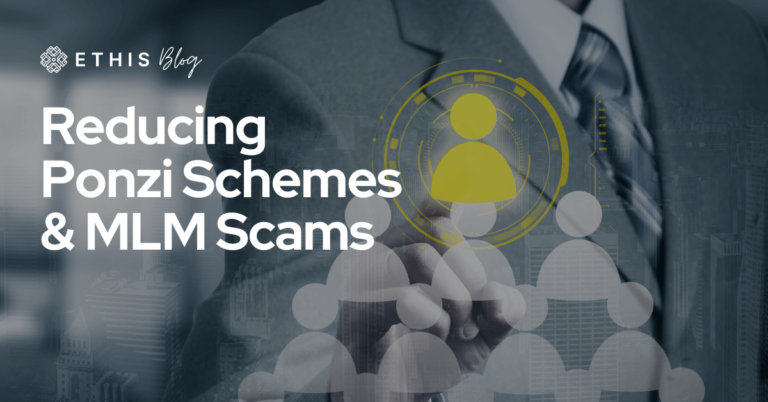
Reducing Ponzi Schemes & MLM Scams
The likelihood of falling prey to Ponzi schemes or multi-level marketing (MLM) scams can be significantly cut down by putting into practice the guidelines below. This is true on an individual level, on a firm level, and on a state level, all of which are potential points of entry for such schemes. There is the potential to save a significant amount of money on all three levels of society by adhering to these recommendations.
This article addresses how you can save money on an individual, company, or state level when it comes to scams.
Addressing the issue on an individual or family level


First educate yourself on an individual level, according to your own expertise and understanding, to get a better understanding of these issues. It is important to always establish strong relationships of trust with friends and family.
This way, they will be more willing to listen to your knowledge and opinion on these schemes, and thus help prevent them from becoming entrapped by any dubious dealings and schemes.
Even though it is undeniably true that education is important, there are still some highly educated and wealthy people who participate in these kinds of schemes. This is because human greed for being rich quickly is what drives people to participate in these forms of activities. Therefore, tighter regulation and supervision should be done at the government level in order to curb the human desire for greediness.
It is also advisable to follow the guidelines of the law of the country. Muslims should also turn to Shariah rules in business and financing because the purpose of both the laws of the country as well as following Shariah rules is to prevent us and our society from any harm.
Related: How to Identify non-Shariah Compliant Investments
Addressing the issue at a company-level


From a Shariah perspective:
The Prophet ﷺ ordered us to not deal with doubtful dealing. Therefore we should strive to stay away from doubtful business operations. From a Shariah perspective, in order to ensure the permissibility or legality of the business, it is necessary that both parties fulfill the requirements of their contract.
The ultimate objective in any transaction in Islam is to uphold the Maqasid Al Shariah (objectives of Shariah law) and this is done through the fulfillment of Shariah requirements. This prevents harm to businesses and those who participate in business dealings.
Recommendations by the SEC


Since the Madoff scheme, the United States SEC (Security Exchange Commission) has taken many steps to improve operations and investigative procedures based on red flags and tips.
Recommendations made by the SEC:



1. Future customers should carefully read the company prospectus, check investment channels being used, and refrain from investing in companies that promise guaranteed, far-fetched or quick earnings.
2. Customers should make note of any warning signs and immediately report them to overseers or administrators for investigation.
3. Investigators should thoroughly follow up on warnings given and make use of teams with many areas of expertise to decrease error and provide cross-checking.
4. Auditors and investigators should be comprehensively trained and have senior-level oversight.
5. Specific units that have expertise in handling complex situations, forensic accounting, and specific country laws should be employed for larger cases as well as for cases that have a greater likelihood of fraud.
By making use of these approaches, investors can considerably decrease their chance of being victims of a Ponzi scheme since investigators will be ready to respond promptly.
Related: Looking Beyond Halal
Preventing Financial Statement Fraud


Most major organisational schemes will often involve some form of financial statement fraud; hence understanding the red flags to look for is truly important.
It is not only the responsibility of auditors and investigators to protect stakeholder interests, but it is also important for organisational directors to ensure that financial statement fraud is not predominant in organisations. Unfortunately, many board directors lack the knowledge and competence needed to adequately examine financial statements, oversee checks and balances and make sure that no fraud exists.
Organisational directors often conveniently do not discover financial statement fraud, due to their financial interest in the company as well as their concentration on earnings. These directors misunderstand the fact that when they ignore oversight procedures and fail to reduce the likelihood of fraud taking place, ultimately they diminish the value of their own investments and also fail to fulfill their commitments to stakeholders. When financial scandals arise, they can set the company back quite a few years. There is also the risk of pushing the company completely out of business.
There are two main recommendations to avoid financial statement scandals:
a) Employ directors on boards that have the skills and knowledge to participate in forensic accounting and auditing practices to make certain that financial statement fraud is prevented before external audits take place.
b) Propose incentives and link directors’ compensation and responsibilities to governance and financial fraud prevention. One way of doing this would be by offering bonuses for financial fraud detection.
Addressing the issue on a state level


Every country should have its own Consumer Protection Commission or a similar public authority in which practical methods can be applied to prevent these schemes from recurring.
These practical methods should include the following:
- Higher authorities must play a supervisory role and act quickly against apparent scams. Severe fines should be imposed on the organizers as well as those involved in the scams.
- It will be worthwhile that the community to be educated by the state, regarding the risk of these schemes.
- The supervisors should be given the latest training and information to increase their expertise and capability to prevent schemes from developing further.
- Any website that operates with scams or encourages these scams should most definitely be banned from operating and they should be shut down immediately.
By following the above recommendations, the likelihood of falling victim to Ponzi schemes or multi-level marketing (MLM) frauds can be considerably reduced. This is true on the level of the individual, the corporation, and the state, all of which are possible entrance points for such schemes. If one were to adhere to these instructions, there is a possibility of preserving sizeable sums of money that, in the absence of such adherence, would be lost to the schemes and





Top Posts
Islamic P2P Crowdfunding Explained
How to Earn Halal Money? The Money Mindset
Halal Investments for Singapore Muslims? It’s time for a shake-up in the Islamic Investments scene.
Smart investment for making Halal money
3 Reasons Why Property Crowdfunding is the Smart Investment for You